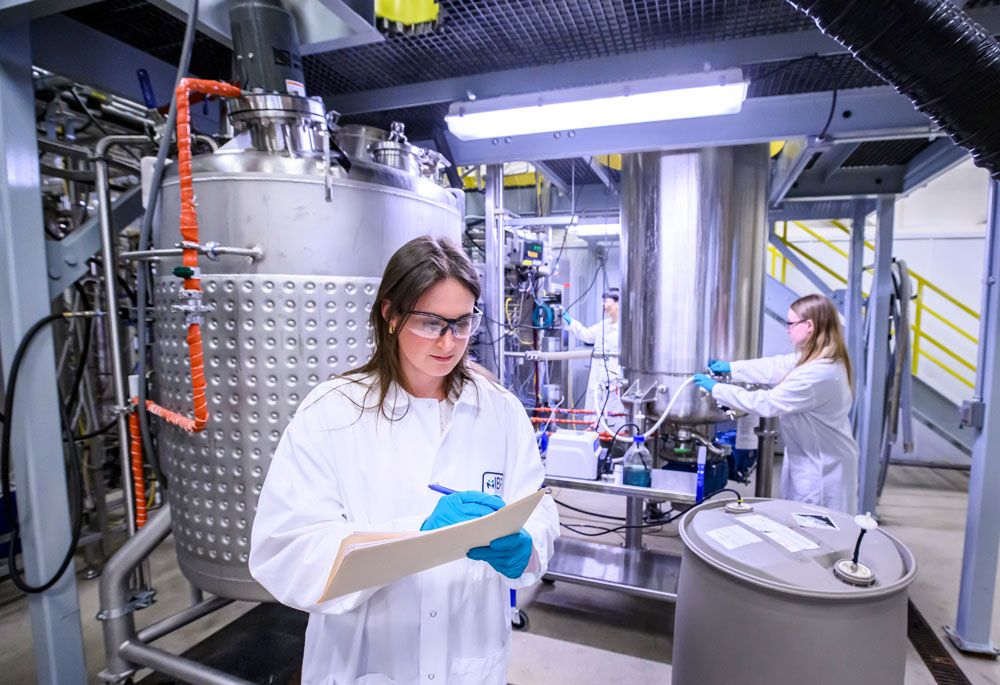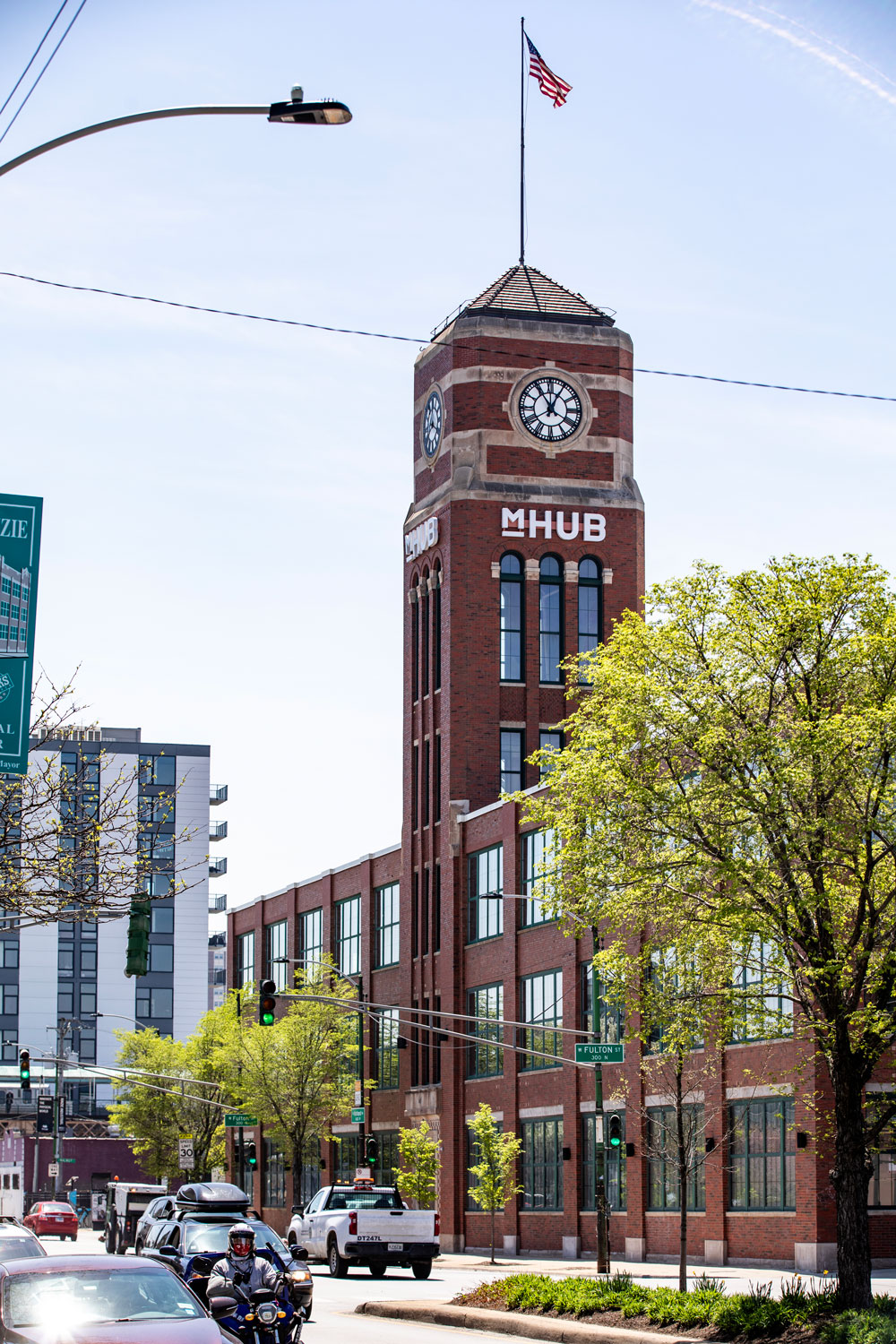In Chicagoland and Champaign — and in Peoria, Rockford, Carbondale and Springfield — Illinois’ innovation ecosystem is hiding in plain sight. Drive through or by the campuses of Bradley University in Peoria, Northern Illinois University in Rockford, Southern Illinois University in Carbondale or the University of Chicago and the Illinois Institute of Technology in the Windy City, and you are steps from one or more of Illinois’ many business incubators and accelerators.
According to Chicago’s Economic Landscape, a May 2025 report from World Business Chicago and the Greater Chicagoland Economic Partnership, the Chicago area is home to nearly 100 incubators and innovation centers that nurture startups in IT, manufacturing, life sciences, logistics and other industries.
Workspace — lab or otherwise — is an immediate need they can fill. But access to networking, mentorship and early-stage funding is in abundant supply too. More than 1,300 startups in the Chicago area have secured $2.3 billion in pre-venture-capital funding since 2016, according to the report, and more than 200 of those advanced to later funding or other successful outcomes.
Incubator Enhancement Grants
Illinois is investing in incubators to ensure future successful outcomes. In mid-July, $7 million in Tech Incubator Enhancement Grant (TIEG) funds were awarded to four recipients. The grants, administered by the Illinois Department of Commerce and Economic Opportunity (DCEO), support entrepreneurship and innovation in key growth industries and strengthen the resilience of both existing and new startup incubators, according to a release from Governor JB Pritzker’s office. “Our technology incubators and start-up ecosystem are positioning our state as a powerhouse in the economy of tomorrow, and I am proud to be strengthening our investment in that future,” said the governor.

The Integrated Bioprocessing Research Laboratory at the University of Illinois, Urbana-Champaign is a bioprocessing product research and development facility that bridges the gap from basic discovery to commercialization. Marissa Nyland is assistant director of operations and safety at IBRL.
Photo by Fred Zwicky of University of Illinois Public Affairs
The TIEG recipients are (1) the 518 Collective at Carl Sandburg College ($1.8 million), Galesburg, a proposed ag-tech-focused incubator; (2) the DeepTech Innovation Lab at mHUB Chicago ($590,200), specializing in HardTech, or digital and hardware integration; (3) EnterpriseWorks 2.0 at University of Illinois Urbana-Champaign ($3 million), a new facility at the Research Park in Champaign-Urbana for startup companies with an emphasis on laboratory and manufacturing commercial spaces for scaling companies; and (4) SouthernTECH High-Tech Food Incubator ($1.6 million) at Southern Illinois University, Carbondale, for a new food processing and manufacturing-based incubator that will provide a lineup of high-tech, energy-efficient and future-proof kitchen equipment.
“Strategic incentivized investments in key sectors will provide critical support to both new and existing technology incubators throughout the state,” noted DCEO Director Kristin Richards.
Statewide Incubator Network
Galesburg, Chicago, Champaign-Urbana and Carbondale. The TIEG recipients’ geographic diversity across Illinois is Exhibit A showing the state’s startup and innovation ecosystem is not confined to the Chicago metro. Exhibit B is the Illinois University Incubator Network (IUIN) that links university incubators around the state to technical assistance resources and a wide range of business startup services. IUIN partners with the University of Illinois EDA University Center and the Illinois FAST (Federal and State Technology) Partnership Center at the University of Illinois Research Park. The latter supports technology-based entrepreneurs (TBE) and startups seeking SBIR/STTR funding for small business innovation research.
IUIN members include:
- EnterpriseWorks at the University of Illinois Urbana-Champaign
- The Peoria NEXT Innovation Center at Bradley University in Peoria
- The University Technology Park (UTP) on the Illinois Institute of Technology campus in Chicago
- EIGERlab at Northern Illinois University in Rockford
- The Technology Innovation Lab of the University of Illinois at Chicago, in the Illinois Medical District
- The Garage at Northwestern University in Evanston
- The Incubator at Southern Illinois University in Carbondale
- The University of Chicago’s Polsky Center for Entrepreneurship and Innovation
- Innovate Springfield at the University of Illinois at Springfield
- The Helix 51 Incubator at Rosalind Franklin University of Medicine and Science in North Chicago
- The Business Innovation and Growth (BIG) Center at Northeastern Illinois University in Chicago
- Ignite Lab at Loyola University Chicago
Not all business incubators in Illinois are located at or administered by universities. Distillery Labs, in Peoria, opened in 2024 as the region’s base for entrepreneurship programs and startups with 40,000 sq. ft. of space. It’s where startup accelerator gener8tor, in partnership with OSF HealthCare, Peoria County, Hanson Professional Services, Central Illinois Angels and Attollo, will house its annual seven-week gBETA pre-accelerator programs for local entrepreneurs.
“This next-level support will cultivate entrepreneurs and startups from a number of sources, including those that may result from concepts and inventions from local companies, like OSF, and provide them with additional expertise and access to capital to take their solution to a commercial product or service,” said Kip McCoy, vice president for innovation integration at Peoria-based OSF HealthCare, announcing the company’s sponsorship of the gBETA program.
“Traditional economic development usually focuses on business attraction and helping existing, and usually larger, local companies grow,” says Christopher Setti, CEO of the Greater Peoria Economic Development Council. “But supporting startups — and particularly scalable and innovative startups — should be considered the critical third leg of the stool. Creating a vibrant startup ecosystem can yield significant economic results, and today’s small idea can turn into tomorrow’s major win.”
Since launching in 2015, according to OSF Healthcare, gBETA program alumni have raised more than $188 million in capital and created more than 2,000 jobs across the U.S. and Canada. The program helps startups gain early customer traction for their product or idea and establish and execute on metrics that make them competitive applicants for full-time, equity-based accelerators or seed investment.
Portals to Growth
Portal Innovations helps startup biotech enterprises meet their early workspace needs with wet/dry lab and office facilities in several cities, including Chicago. It has 50,000 sq. ft. on the Fulton Labs campus in the city’s booming Fulton Market neighborhood. It’s where Northwestern University spinoff Grove Biopharma got its start. The company is developing its Bionic Biologics drug development platform. In April, it announced the close of a $30 million Series A financing, which will enable the company to expand its footprint in the Portal space.
Portal Innovations and the Polsky Center for Entrepreneurship and Innovation at the University of Chicago are developing a 22,000-sq.-ft. science startup incubator at the Hyde Park Labs development called the UChicago Science Incubator. Portal will manage the design, buildout and support programming in collaboration with the Polsky Center, according to the University of Chicago.
“The partnership between the University of Chicago and Portal Innovations underscores the significance of collaboration between academia and industry,” said Juan de Pablo, executive vice president for science, innovation, national laboratories and global initiatives at UChicago, in a statement. “By working together, we are better equipped to support our researchers and scientists in advancing their scientific research and innovation toward impact through commercialization.”
“We are thrilled to partner with the University of Chicago, a storied institution that has fueled scientific breakthroughs in biotech, energy, quantum, and beyond,” added John Flavin, founder and CEO of Portal Innovations. “With science moving quickly, it’s necessary to connect academic researchers with private industry including entrepreneurs, venture capitalists and corporate partners to commercialize innovation while attracting and retaining talent locally.”
The University of Chicago also is partnering with CIC, a global developer of innovation workspace, on a state-of-the-art lab incubator at Hyde Park. CIC Labs at Hyde Park Labs will include a facility spanning 20,000 sq. ft. of wet lab and office space, operating within UChicago’s leased space in Hyde Park Labs.
The University of Chicago says the CIC space will focus on startup companies of UChicago faculty members, helping to extend the impact of their research, discoveries and intellectual property.

